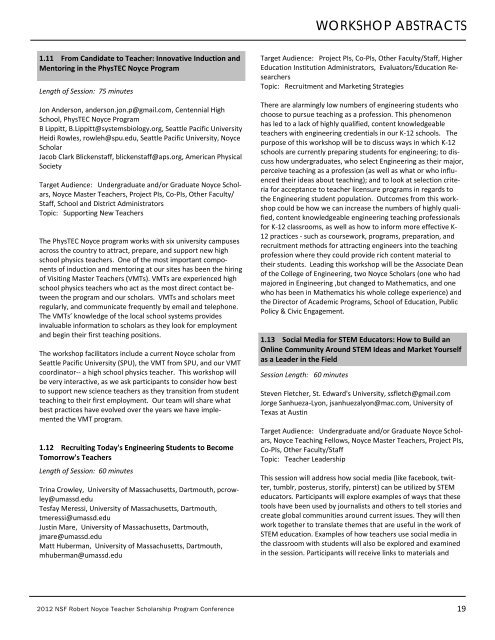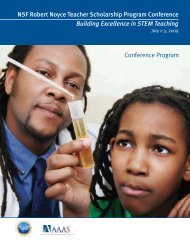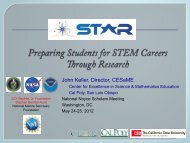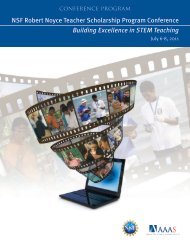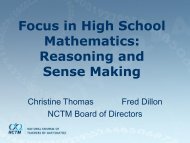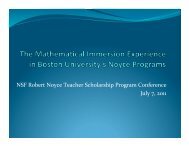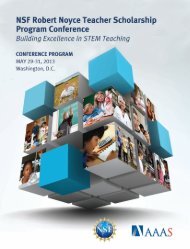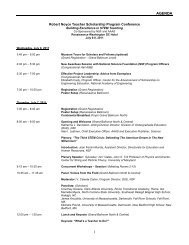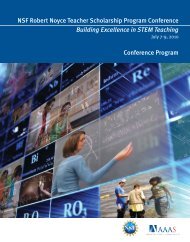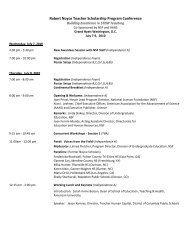WORKSHOP ABSTRACTS1.8 Preparing <strong>Noyce</strong> Scholars for Effective Instruction ofEnglish Language Learners in STEM ClassroomsLength of Session: 60 minutesOrlando B. Alonso, Lehman College, CUNYMargo DelliCarpini, margo.dellicarpini@lehman.cuny.edu, CUNYTarget Audience: Undergraduate and/or Graduate <strong>Noyce</strong> Scholars,<strong>Noyce</strong> Teaching Fellows, <strong>Noyce</strong> Master Teachers, Project PIs,Co‐PIs, Other Faculty/Staff, School and District Administrators,Higher Education Institution AdministratorsTopic: Innovative <strong>Noyce</strong> <strong>Program</strong> Practices and Teacher PreparationModelsLittle research exists on effective ways to prepare secondarymathematics and science teachers to work with English LanguageLearners (ELLs) in the mainstream mathematics and science(MS) classrooms. Given the achievement gap that existsbetween ELLs and their native speaking counterparts in MS subjectsand the growing numbers of ELLs in US schools, this becomesa critical issue since academic success for these studentsdepends on the effectiveness of instruction they receive not onlyin the English as a second language classroom (ESL), but in themainstream classroom as well. We describe the implementationof a course specifically designed to prepare <strong>Noyce</strong> scholars in MSteacher education programs to work with ELLs in MS classroomsthrough effective content and language integration and to provideopportunities for collaboration between these Scholars andESL teacher candidates to target the needs of ELLs in the contentand ESL classroom.This course was co‐developed and is co‐taught by a MathematicsEducation Professor and TESOL Professor with visits from a ScienceEducation faculty member. We describe the rationale behindthe development of the course, provide a detailed descriptionof the course and its requirements, and present findingsfrom the <strong>Noyce</strong> scholars enrolled in terms in positive change inknowledge, skills, and beliefs related to working with ELLs insecondary‐level mainstream MS classrooms. We share lessonslearned and modifications made to the course based on findingsto date and offer suggestions for teacher education programsinterested in developing and adopting similar coursework.1.9 Project‐based Inquiry as a Model for Teaching, Learningand Assessing Science in the Grade 7‐12 ClassroomLength of Session: 75 minutesRegina Toolin, University of VermontBeth White, Beth.White@UVM.edu, University of Vermont,Graduate Research AssistantTarget Audience: Undergraduate and/or Graduate <strong>Noyce</strong> Scholars,<strong>Noyce</strong> Teaching Fellows, <strong>Noyce</strong> Master Teachers, Project PIs,Co‐PIs, Other Faculty/Staff, School and District AdministratorsTopic: Innovative <strong>Noyce</strong> <strong>Program</strong> Practices and Teacher PreparationModelsIn this workshop, a model for understanding and applying principlesof project‐based inquiry (PBI) in the 7‐12 science classroomwill be presented. Participants will engage in an interactive discussionof PBI principles, examine a variety of PBI examplesacross the 7‐12 spectrum and review a template for PBI designbased on backward design curriculum principles. During theworkshop, participants will utilize the PBI template to initiate thedesign of a project that may be integrated into their curriculumand teaching. <strong>The</strong> workshop will culminate in an open discussionabout issues and limitations of PBI development and implementationin grades 7‐12.1.10 CCSS Standards for Mathematical Practice: What are<strong>The</strong>y, and How Can <strong>The</strong>y Improve Instruction Today?Length of Session: 75 minutesDavida Fischman, CSU San BernardinoTarget Audience: Undergraduate and/or Graduate <strong>Noyce</strong> Scholars,<strong>Noyce</strong> Teaching Fellows, <strong>Noyce</strong> Master Teachers, Project PIs,Co‐PIs, Other Faculty/Staff, School and District AdministratorsTopic: Resources for Teachers<strong>The</strong> Common Core State Standards (CCSS) encourage a conceptualapproach to mathematics and provide a coherent developmentof K‐12 mathematics through the grades. <strong>The</strong> CCSS documentbegins with Standards for Mathematical Practice, whichdescribe a variety of expertise, proficiencies, and processes thatare valuable tools for all students of mathematics. Implementationof these practices is crucial to the success of the CCSS.Whether the content being taught is taken from the currentstate standards or from the Common Core Standards, thesemathematical practices will help increase both understandingand capabilities for our students.What is meant in each of the Standards for Mathematical Practiceis not always obvious; this session will provide time and contextto delve deeply into several of these standards to get a bettersense of their richness and complexity. We will view and analyzevideos to gain understanding of how these practice standardsmight play out in the classroom, and participants will developtheir own strategies to incorporate them into currentteaching today, so as to enrich the teaching of the current curriculumwhile getting a head‐start on implementing the CommonCore State Standards.18<strong>2012</strong> NSF <strong>Robert</strong> <strong>Noyce</strong> Teacher <strong>Scholarship</strong> <strong>Program</strong> <strong>Conference</strong>
WORKSHOP ABSTRACTS1.11 From Candidate to Teacher: Innovative Induction andMentoring in the PhysTEC <strong>Noyce</strong> <strong>Program</strong>Length of Session: 75 minutesJon Anderson, anderson.jon.p@gmail.com, Centennial HighSchool, PhysTEC <strong>Noyce</strong> <strong>Program</strong>B Lippitt, B.Lippitt@systemsbiology.org, Seattle Pacific UniversityHeidi Rowles, rowleh@spu.edu, Seattle Pacific University, <strong>Noyce</strong>ScholarJacob Clark Blickenstaff, blickenstaff@aps.org, American PhysicalSocietyTarget Audience: Undergraduate and/or Graduate <strong>Noyce</strong> Scholars,<strong>Noyce</strong> Master Teachers, Project PIs, Co‐PIs, Other Faculty/Staff, School and District AdministratorsTopic: Supporting New Teachers<strong>The</strong> PhysTEC <strong>Noyce</strong> program works with six university campusesacross the country to attract, prepare, and support new highschool physics teachers. One of the most important componentsof induction and mentoring at our sites has been the hiringof Visiting Master Teachers (VMTs). VMTs are experienced highschool physics teachers who act as the most direct contact betweenthe program and our scholars. VMTs and scholars meetregularly, and communicate frequently by email and telephone.<strong>The</strong> VMTs’ knowledge of the local school systems providesinvaluable information to scholars as they look for employmentand begin their first teaching positions.<strong>The</strong> workshop facilitators include a current <strong>Noyce</strong> scholar fromSeattle Pacific University (SPU), the VMT from SPU, and our VMTcoordinator‐‐ a high school physics teacher. This workshop willbe very interactive, as we ask participants to consider how bestto support new science teachers as they transition from studentteaching to their first employment. Our team will share whatbest practices have evolved over the years we have implementedthe VMT program.1.12 Recruiting Today's Engineering Students to BecomeTomorrow's TeachersLength of Session: 60 minutesTrina Crowley, University of Massachusetts, Dartmouth, pcrowley@umassd.eduTesfay Meressi, University of Massachusetts, Dartmouth,tmeressi@umassd.eduJustin Mare, University of Massachusetts, Dartmouth,jmare@umassd.eduMatt Huberman, University of Massachusetts, Dartmouth,mhuberman@umassd.eduTarget Audience: Project PIs, Co‐PIs, Other Faculty/Staff, HigherEducation Institution Administrators, Evaluators/Education ResearchersTopic: Recruitment and Marketing Strategies<strong>The</strong>re are alarmingly low numbers of engineering students whochoose to pursue teaching as a profession. This phenomenonhas led to a lack of highly qualified, content knowledgeableteachers with engineering credentials in our K‐12 schools. <strong>The</strong>purpose of this workshop will be to discuss ways in which K‐12schools are currently preparing students for engineering; to discusshow undergraduates, who select Engineering as their major,perceive teaching as a profession (as well as what or who influencedtheir ideas about teaching); and to look at selection criteriafor acceptance to teacher licensure programs in regards tothe Engineering student population. Outcomes from this workshopcould be how we can increase the numbers of highly qualified,content knowledgeable engineering teaching professionalsfor K‐12 classrooms, as well as how to inform more effective K‐12 practices ‐ such as coursework, programs, preparation, andrecruitment methods for attracting engineers into the teachingprofession where they could provide rich content material totheir students. Leading this workshop will be the Associate Deanof the College of Engineering, two <strong>Noyce</strong> Scholars (one who hadmajored in Engineering ,but changed to Mathematics, and onewho has been in Mathematics his whole college experience) andthe Director of Academic <strong>Program</strong>s, School of Education, PublicPolicy & Civic Engagement.1.13 Social Media for STEM Educators: How to Build anOnline Community Around STEM Ideas and Market Yourselfas a Leader in the FieldSession Length: 60 minutesSteven Fletcher, St. Edward's University, ssfletch@gmail.comJorge Sanhueza‐Lyon, jsanhuezalyon@mac.com, University ofTexas at AustinTarget Audience: Undergraduate and/or Graduate <strong>Noyce</strong> Scholars,<strong>Noyce</strong> Teaching Fellows, <strong>Noyce</strong> Master Teachers, Project PIs,Co‐PIs, Other Faculty/StaffTopic: Teacher LeadershipThis session will address how social media (like facebook, twitter,tumblr, posterus, storify, pinterst) can be utilized by STEMeducators. Participants will explore examples of ways that thesetools have been used by journalists and others to tell stories andcreate global communities around current issues. <strong>The</strong>y will thenwork together to translate themes that are useful in the work ofSTEM education. Examples of how teachers use social media inthe classroom with students will also be explored and examinedin the session. Participants will receive links to materials and<strong>2012</strong> NSF <strong>Robert</strong> <strong>Noyce</strong> Teacher <strong>Scholarship</strong> <strong>Program</strong> <strong>Conference</strong>19
- Page 1 and 2: NSF Robert Noyce Teacher Scholarshi
- Page 3 and 4: NSF Robert Noyce Teacher Scholarshi
- Page 5 and 6: CONTENTSAbout the NSF Robert Noyce
- Page 7 and 8: AGENDAWEDNESDAY, MAY 23, 20123:30 p
- Page 9 and 10: HOTEL FLOOR PLANS2012 NSF Robert No
- Page 11 and 12: SPEAKER BIOGRAPHIESL’Oreal USA an
- Page 14 and 15: WORKSHOP ABSTRACTSSession I: Thursd
- Page 16 and 17: WORKSHOP ABSTRACTSTarget Audience:
- Page 20 and 21: WORKSHOP ABSTRACTStutorials for usi
- Page 22 and 23: WORKSHOP ABSTRACTSentation, three o
- Page 24 and 25: WORKSHOP ABSTRACTS2.9 Science NetLi
- Page 26 and 27: WORKSHOP ABSTRACTS2.14 Understandin
- Page 31 and 32: WORKSHOP ABSTRACTSThis session will
- Page 33: WORKSHOP ABSTRACTSColleges for Teac
- Page 36 and 37: WORKSHOP ABSTRACTSlesson and will p
- Page 38 and 39: PI POSTER ABSTRACTS1Title: Teachers
- Page 40 and 41: PI POSTER ABSTRACTSJulie A. Luft, A
- Page 42 and 43: PI POSTER ABSTRACTSClinical experie
- Page 44 and 45: PI POSTER ABSTRACTSon topics includ
- Page 46 and 47: PI POSTER ABSTRACTSof the group at
- Page 48 and 49: PI POSTER ABSTRACTSopportunities. E
- Page 50 and 51: PI POSTER ABSTRACTS3. Partnership w
- Page 52 and 53: PI POSTER ABSTRACTSpated in four ty
- Page 54 and 55: PI POSTER ABSTRACTS41Title: Teacher
- Page 56 and 57: PI POSTER ABSTRACTSpost‐baccalaur
- Page 58 and 59: PI POSTER ABSTRACTSThe internships
- Page 60 and 61: PI POSTER ABSTRACTSin the degree pr
- Page 62 and 63: PI POSTER ABSTRACTSPresenter(s): Ro
- Page 64 and 65: PI POSTER ABSTRACTSSanthi Prabahar,
- Page 66 and 67: PI POSTER ABSTRACTSNicholle Stark,
- Page 68 and 69:
PI POSTER ABSTRACTSprograms and dis
- Page 70 and 71:
PI POSTER ABSTRACTSresulting in tea
- Page 72 and 73:
PI POSTER ABSTRACTSyears. We have m
- Page 74 and 75:
PI POSTER ABSTRACTSschool district,
- Page 76 and 77:
PI POSTER ABSTRACTS95Title: The Noy
- Page 78 and 79:
PI POSTER ABSTRACTS101Title: SUNY C
- Page 80 and 81:
PI POSTER ABSTRACTSresources and su
- Page 82 and 83:
PI POSTER ABSTRACTSThis project als
- Page 84 and 85:
PI POSTER ABSTRACTSThe UCR Noyce Sc
- Page 86 and 87:
PI POSTER ABSTRACTSInstitution: Uni
- Page 88 and 89:
PI POSTER ABSTRACTSedge through the
- Page 90 and 91:
PI POSTER ABSTRACTSand program cont
- Page 92 and 93:
PI POSTER ABSTRACTS136Title: Title:
- Page 94 and 95:
PI POSTER ABSTRACTSIn addition, the
- Page 96 and 97:
PI POSTER ABSTRACTSgoals for next y
- Page 98 and 99:
PI POSTER ABSTRACTS152Title: Univer
- Page 100 and 101:
PI POSTER ABSTRACTSCo‐PI(s): Susa
- Page 102 and 103:
PI POSTER ABSTRACTSwork samples fro
- Page 104 and 105:
PI POSTER ABSTRACTSPresenter(s): Mi
- Page 106 and 107:
PI POSTER ABSTRACTSThe action resea
- Page 108 and 109:
PI POSTER ABSTRACTSin‐service tea
- Page 110 and 111:
SCHOLAR/FELLOW POSTER ABSTRACTSward
- Page 112 and 113:
SCHOLAR/FELLOW POSTER ABSTRACTSers
- Page 114 and 115:
SCHOLAR/FELLOW POSTER ABSTRACTSS/F1
- Page 116 and 117:
SCHOLAR/FELLOW POSTER ABSTRACTScert
- Page 118 and 119:
SCHOLAR/FELLOW POSTER ABSTRACTSThis
- Page 120 and 121:
SCHOLAR/FELLOW POSTER ABSTRACTSS/F4
- Page 122 and 123:
SCHOLAR/FELLOW POSTER ABSTRACTSS/F5
- Page 124 and 125:
SCHOLAR/FELLOW POSTER ABSTRACTSthe
- Page 127 and 128:
POSTER ABSTRACT INDEXAAbraham, Larr
- Page 129 and 130:
POSTER ABSTRACT INDEXEscalante, Mic
- Page 131 and 132:
POSTER ABSTRACT INDEXLandon, Laurie
- Page 133 and 134:
POSTER ABSTRACT INDEXRodriguez, Jen
- Page 135:
POSTER ABSTRACT INDEXZZaikowski, Lo


